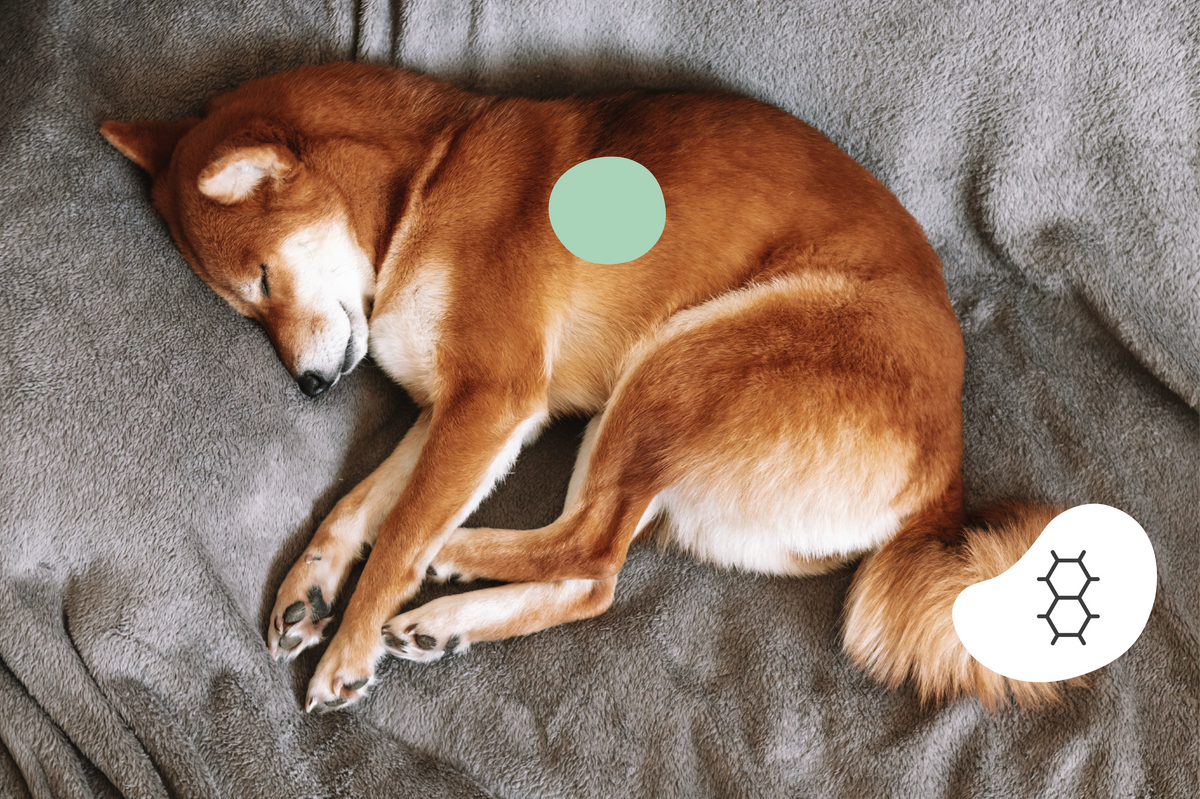Everything you need to know about dog sleep

Take a moment to ask yourself: How does your dog sleep? It may seem like a trivial subject, but in reality, your four-legged friend's sleep is crucial to his health and happiness. Like us, our pooches have sleeping habits that fluctuate according to their age, breed and lifestyle. In fact, your pooch could sleep between 12 and 14 hours a day, and sometimes up to 20 hours if it's a small puppy or a senior.
In this article, we slip into our best friends' bedtimes to understand their sleep rituals. Let's chat:
And of course, it's impossible to talk about sleep without mentioning the importance of a balanced diet. That's where Marly & Dan come in, with their tasty, 100% natural treats, perfect for helping your dog get a good night's sleep. Ready for a night out in the world of canine dreams?
The dog's sleep
Dogs, like cats, are popular pets and they also have distinct sleeping habits. Dogs need a lot of sleep to stay healthy and the amount of sleep they get can vary considerably depending on the breed, size and age of the dog. On average, an adult dog sleeps between 12 and 14 hours a day, but puppies and older dogs tend to sleep longer than healthy adult dogs.
What is the average length of sleep in dogs?
The amount of sleep a dog gets depends on its age and level of daily activity.
- Puppies need a lot of sleep and can sleep up to 20 hours a day, which represents around 90% of their time.
- Adult dogs reduce their sleep time to around 12 to 15 hours a day, or around 50 to 65% of their time.
- Older dogs can spend up to 75% of their day sleeping, averaging around 18 hours a day.
Sleep requirements can also be influenced by physical effort, weather conditions and the dog's level of boredom or exercise.
The different sleep phases for dogs
Deep sleep in dogs
Deep sleep in dogs is a phase of the sleep cycle characterised by complete muscle relaxation and reduced brain activity. During this period, the dog is immobile, its breathing is slow and regular, and its muscle tone is low. Deep sleep is essential for the dog's physical and mental recovery, helping to regenerate tissues, consolidate memory and strengthen the immune system.
Does a dog have dreams?
During REM sleep, the dog's brain returns to near-normal activity, the muscles relax and the body unwinds. It is during this phase that the dog consolidates its memories of the day through dreams. Wondering whether your dog can dream and have nightmares? The answer lies in his behaviour during sleep. As mentioned above, dreams in dogs occur when they enter the REM sleep phase. During this period, you can observe muscle contractions and eye movements under their eyelids. Their muscles are completely relaxed, but their intense brain activity allows dreams to be produced. According to science, dogs probably dream about events that happen during the day: their walks, their games, their interactions with other dogs and even their beloved owners.

Sleep disorders in dogs
Sleep disorders in dogs can have a negative impact on their health and well-being. Common sleep problems in dogs include insomnia, sleep apnoea and nightmares. Dogs can also have sleep problems due to illnesses or medical conditions such as arthritis, allergies, hyperthyroidism and heart failure. As with cats, it's important to provide dogs with a comfortable and safe place to sleep. Dogs need a comfortable bed and a quiet place to rest, away from noise and distractions. Dog owners should also ensure that their pets get enough exercise and mental stimulation to promote quality sleep.
Ultimately, sleep is essential for the health and well-being of pets, whether cats or dogs. Understanding each pet's unique sleeping habits and providing an appropriate sleep environment can help ensure their long-term health and happiness.
Tips and tricks for a peaceful dog's night
Sleep is the key to your pooch's health and energy. Here are a few tips to help him enjoy a good night's sleep:
- Establish a daily routine: Dogs thrive on regular routines. Trying to maintain a consistent routine for mealtimes, walks, playtime and bedtime can help your dog know what to expect and feel more comfortable, which can improve the quality of his sleep.
- Provide a comfortable sleeping area: Make sure your dog has a comfortable bed in a quiet area free from distractions. The right sleeping environment is essential for a good night's rest.
- Regular exercise: Physical activity is essential for good health and good sleep. Make sure your dog gets enough exercise during the day to help him expend his energy and sleep soundly at night.
- Healthy nutrition: A balanced, quality diet can greatly influence the quality of your dog's sleep. Marly & Dan products offer a range of healthy, functional treats, made from 100% natural ingredients, that can support your dog's overall health and improve the quality of his sleep.
Discover Marly & Dan's functional treats
- Limiting fluid intake before bedtime: Just like humans, dogs can be woken up at night by the need to urinate. Try to limit your dog's water intake in the hours before bedtime to avoid waking up at night.
- Consult a vet: If your dog seems to have persistent sleep problems or sudden changes in his sleeping habits, it's best to consult a vet. Sleep disturbances may be a sign of underlying health problems that require medical attention.
It's simple: your dog's gentle, restorative sleep is the fuel that keeps him happy and healthy. Understanding your dog's unique sleeping habits and adopting tips on how to pamper him can make a huge difference to his quality of life. A well-paced routine, a cosy place to sleep, regular exercise and a healthy diet are the magic ingredients for starry nights. However, if your pooch seems to be counting sheep a little too often, don't hesitate to consult a vet. Restless sleep could be a sign of minor health problems that need to be checked.
Marly & Dan are committed to supporting your dog's well-being by offering a range of quality, 100% natural food products. Feel free to explore our selection of healthy and functional treats that can support your dog's overall health and improve the quality of his sleep.
If you'd like to find out more about your pet's health and wellbeing, check out our blog where we discuss a variety of pet health topics.
Remember, a dog that sleeps well is a healthy, happy dog!

